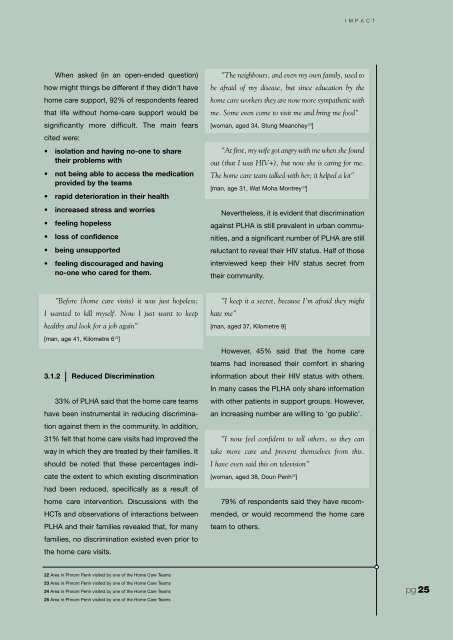PDF File - hivpolicy.org
PDF File - hivpolicy.org
PDF File - hivpolicy.org
- No tags were found...
Create successful ePaper yourself
Turn your PDF publications into a flip-book with our unique Google optimized e-Paper software.
IMPACTWhen asked (in an open-ended question)how might things be different if they didn't havehome care support, 92% of respondents fearedthat life without home-care support would besignificantly more difficult. The main fearscited were:• isolation and having no-one to sharetheir problems with• not being able to access the medicationprovided by the teams• rapid deterioration in their health• increased stress and worries• feeling hopeless• loss of confidence• being unsupported• feeling discouraged and havingno-one who cared for them."The neighbours, and even my own family, used tobe afraid of my disease, but since education by thehome care workers they are now more sympathetic withme. Some even come to visit me and bring me food"[woman, aged 34, Stung Meanchey 23 ]"At first, my wife got angry with me when she foundout (that I was HIV+), but now she is caring for me.The home care team talked with her; it helped a lot"[man, age 31, Wat Moha Montrey 24 ]Nevertheless, it is evident that discriminationagainst PLHA is still prevalent in urban communities,and a significant number of PLHA are stillreluctant to reveal their HIV status. Half of thoseinterviewed keep their HIV status secret fromtheir community."Before (home care visits) it was just hopeless;I wanted to kill myself. Now I just want to keephealthy and look for a job again"[man, age 41, Kilometre 6 22 ]3.1.2 Reduced Discrimination33% of PLHA said that the home care teamshave been instrumental in reducing discriminationagainst them in the community. In addition,31% felt that home care visits had improved theway in which they are treated by their families. Itshould be noted that these percentages indicatethe extent to which existing discriminationhad been reduced, specifically as a result ofhome care intervention. Discussions with theHCTs and observations of interactions betweenPLHA and their families revealed that, for manyfamilies, no discrimination existed even prior tothe home care visits."I keep it a secret, because I'm afraid they mighthate me"[man, aged 37, Kilometre 9]However, 45% said that the home careteams had increased their comfort in sharinginformation about their HIV status with others.In many cases the PLHA only share informationwith other patients in support groups. However,an increasing number are willing to 'go public'."I now feel confident to tell others, so they cantake more care and prevent themselves from this.I have even said this on television"[woman, aged 38, Doun Penh 25 ]79% of respondents said they have recommended,or would recommend the home careteam to others.22 Area in Phnom Penh visited by one of the Home Care Teams23 Area in Phnom Penh visited by one of the Home Care Teams24 Area in Phnom Penh visited by one of the Home Care Teams25 Area in Phnom Penh visited by one of the Home Care Teamspg 25
















